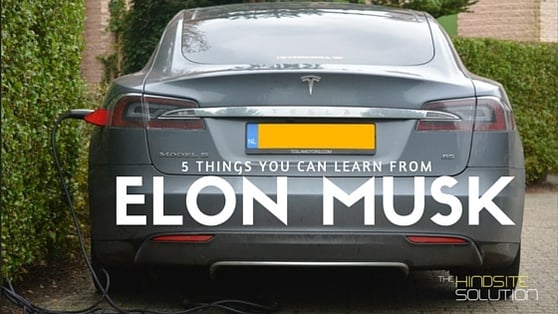
Elon Musk has amassed a fortune running a number of successful businesses. His initial fortune was earned in Internet startups like Zip2 and PayPal. He took those profits and invested in the future - an aeronautics startup, SpaceX, an electric car startup, Tesla, and a solar installation startup, SolarCity. Despite incredibly long odds battling firmly entrenched industry titans, Musk has been able to out-innovate his competition and build valuable businesses.
Here are five things you can learn from Musk:
Have a clear vision.
Perhaps the most amazing thing about Musk is the clarity of his vision. At its core, he wants to save humanity. His SpaceX rockets aren’t about getting payloads into space cheaply. It’s about eventually getting humans to Mars, because Musk believes that if humanity is multi-planetary, we’re more likely to survive. Now that’s visionary.
In fact, that long-term vision has had short-term consequences. Instead of going public - and making himself, his investors and his employees boatloads of money - Musk has deferred. Why? Because it’s at odds with his vision. He believes, rightly so, that a public company will have more pressure than a private one to eschew long-term goals - like populating Mars - for short-term profits.
Not only has his vision helped him build a futuristic empire of businesses - the rocket launching SpaceX, the sexy electric car giant Tesla, the solar energy installation company SolarCity - but it’s also helped make sound business decisions.
So have a vision for your business. Ask yourself - what do you want to be? What do you want to do? What’s your purpose? Then pour all of your energy into that vision, without compromise. Whenever you face a tough decision, revisit your vision statement. It should help clarify your next step.
Don’t be afraid to get your hands dirty.
A piece of a rocket from a supplier once cracked. Musk wanted to determine if it was a faulty piece of equipment or if it was due to stress from testing. What did Musk do? He grabbed some epoxy and, dressed in his designer clothes, fixed the crack. He’s not afraid to get his hands dirty.
Musk is a doer at heart. He’s got an engineer’s mind and a tinkerer’s attitude. Like Musk, don’t be afraid to roll up your sleeves and get things done. You want to spend time working on your business, not in it, but if something needs to get done, do it.
Hire great people.
Musk was able to succeed creating a number of breakout businesses because he’s a shrewd talent evaluator. He’s connected to some of the best engineering programs and is able to get young, smart, hungry graduates to work for him.
The culture he’s created at his company helps. He’s able to attract the best and brightest not necessarily because he pays the most, but because he offers a startup culture that enables experimentation. His vision is different than industry titans like Lockheed, Boeing or Ford, which helps him attract young geniuses. And his businesses aren’t bureaucratic messes that require 6 layers of management approval.
If you want to have a great business, hire great people. In a competitive hiring environment, be like Musk and make it easy for employees to do their jobs. Great employees want to be challenged, so create an environment that challenges your employees. SpaceX and Tesla are very demanding places to work - 12-16 hour days are the norm - but people want to work there because they feel they’re making a difference.
Think about how can your business makes a difference. Why would someone want to work for you? How do you inspire your employees to do more? A business is only as good as his employees, and according to Musk a great engineer is worth three good ones. So find those great employees and set them free to make your business better.
Be different.
No one thought SpaceX could successfully create a rocket from scratch. No one thought Tesla could build the best car on Earth. But that’s because they didn’t think like Musk. They thought that to build a rocket cheaply, you had to use existing suppliers. That selling cars had to involve a showroom and commissioned salespeople. That the real money in cars is in the maintenance work.
Not Musk. SpaceX succeeded because they thought differently. They built rockets from scratch. Engineers worked side-by-side with the manufacturing team to develop the rockets. Tesla thought differently. They sold cars online. They eliminated a lot of the moving parts in a car, and eliminated a lot of cost maintenance.
Be different. Look for new ways to do things in your business. Don’t copy your competitors. Always be thinking about new ways to sell, new ways to service and new ways to train. As Musk has famously said, “If things are not failing, you are not innovating enough.”
Never settle for good enough.
When Tesla was putting the finishing touches on its Model S car, Musk gave it a once over. He hated the visor. It had a visible seam and visible screws holding it to the car. He demanded it be fixed.
If you’re trying to build a great business, good enough isn’t good enough. Like Musk, strive for perfection. It may mean short-term delays. It may mean less short-term profitability, but settling for anything less than the best will have long-term consequences.
Bonus Tip: Leverage technology.
When Musk started SpaceX, most rockets were still using technology from the 1960s. Dials, levers and computer algorithms hadn't been upgraded since the days of Sputnik, seemingly.
Musk changed that. Because he built his rockets from the ground up, he used modern technology to improve the way rockets operated.
Do the same in your business. Not using field service software? Invest in it. Not using smartphone or tablets in the field to collect data? It will streamline your entire business.
Want more tips on how to be different? Then download our free eBook, 33 Stupid Things Contractors Do (And How to Fix Them) today!








